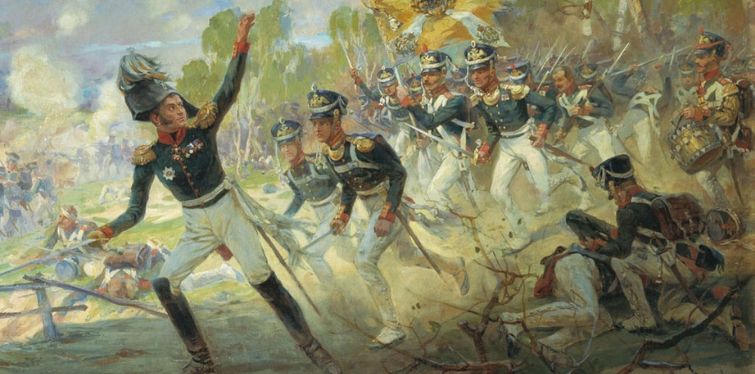Our latest blog post takes a look at the life and military career of Nikolay Raevsky, the Russian VII Corps commander who played a significant part in the major engagements of the 1812 campaign, giving his name to the Russian Great Redoubt on the battlefield of Borodino in the process.
Nikolay Raevsky (1771-1829)
Nikolay Raevsky was born in 1771 to an old noble family in St Petersburg. His father of the same name was a colonel in the Izmailovsky Guards. Nikolay Raevsky senior had died of wounds sustained during the Russo-Turkish War (1768-74) several months before his son’s birth. The young Nikolay followed his father into military service and first saw action in 1787 in the subsequent Russo-Turkish War (1787-91). In 1789 Raevsky was transferred to the Nizhny Novgorod Dragoon Regiment, and became its commander in 1794. In 1796, Raevsky led this regiment in Count Valerian Zubov’s Persian campaign.
In May 1797 Raevsky was dismissed from service by Tsar Paul, becoming one of many army officers who were dismissed by the new Tsar for no particular reason. Upon the accession of Tsar Alexander I, Raevsky returned to the army with the rank of Major-General but requested to leave military service several months later, this time on his own volition.
Raevsky would only return to the army in 1807, when the Russian army was fighting Napoleon’s Grande Armée during the War of the Fourth Coalition. Raevsky was given command of a jaeger brigade to cover the vanguard under his close friend Prince Bagration. He distinguished himself at the Battle of Guttstadt (5 June) and despite the decisive defeat at Friedland on 14 June, during which he commanded all the jaeger regiments, Raevsky received the Order of St Vladimir 3rd Class and St Anne 1st Class. Raevsky went on to serve in Finland, where he was promoted to Lieutenant-General, before serving in the Turkish War from 1809 to 1811.
In anticipation of Napoleon’s invasion, Lieutenant-General Raevsky was given command of VII Infantry Corps in Prince Bagration’s Second Army in 1812. He therefore had around half of Bagration’s 45,000-strong army under his command. Once the Russian command realised the size of Napoleon’s invasion force, Bagration was obliged to head to Vitebsk to join his army to that of General Mikhail Barclay de Tolly’s First Army. On 21 July Bagration received news that Marshal Davout had just beaten him to Mogilev, cutting off the Second Army’s path to Vitebsk. On 23 July, Raevsky was ordered to attack Davout at Saltanovka near Mogilev in an effort to open the road.
Raevsky divided his army into two columns. The first, under Raevsky himself, would launch a frontal assault at Saltanovka, while the second, Major General Paskevich’s 26th Division, would attempt to outflank Davout on the left. The two columns were supposed to attack at the same time, but Raevsky missed his signal. Despite attempting, several attacks over the dam at Saltanovka, Raevsky was repulsed. During one such attempt he led the Smolensk Regiment into battle with his 11- and 17-year old sons at his side. This courageous demonstration made Raevsky’s name famous throughout the Russian army.
Though he failed to break through, Raevsky’s rearguard action won Bagration time to retreat to Smolensk and join up with Barclay at the beginning of August. Following an ill-advised offensive, Barclay and Bagration hurried to return to Smolensk while General Dmitry Neverovsky successfully held Ney and Murat at bay at Krasny on 14 August. VII Corps were the first to return to Smolensk and Raevsky was tasked with the defence of the city with his 15,000 men while the remainder of the First and Second armies hurried back.
Raevsky deployed General Paskevich within Smolensk’s fortress, while Illarion Vasilchikov’s 12th Division occupied the city’s western suburbs, taking up their position on the evening of the 15th. On the 16th, Napoleon launched a frontal assault on the city. While the attackers managed to capture the suburbs, Paskevich held his position on the Royal Bastion with the help of heavy artillery fire from the Russian batteries. The First and Second armies began to arrive at Smolensk by the evening. At the end of the day, Raevsky’s men were withdrawn from the city and replaced by General Dmitry Dokhturov’s VI Corps. The Russians managed to defend Smolensk for another day, but Barclay eventually ordered withdrawal to prevent Napoleon from surrounding the city.
Having borne the brunt of Napoleon’s attack on Smolensk, Raevsky would go on to play a pivotal role at the Battle of Borodino on 7th September. His men occupied the Great Redoubt – also known as the Raevsky Redoubt. The position was the lynchpin of the Russian line and the fate of the battle – and the Russian army – depended on it. After repelling the enemy’s initial attacks, VII Corps was subject to terrible artillery fire and was temporarily driven out of the Redoubt. A brilliant counterattack by Generals Kutaisov and Ermolov regained the redoubt, at the cost of the former’s life. Raevsky’s men suffered terrible losses and had to be reinforced with units from IV and VI Corps. Despite contending with a leg injury, Raevsky was at the front with his men and claimed at the end of the battle that he could not gather up more than 700 men from his Corps.
Following Kutuzov’s decision to retreat from Borodino, Raevsky was present at the Council of Fili where the Russian generals deliberated over whether to abandon Moscow or to fight another battle. Raevsky was among the minority who advocated retreat, arguing that the terrain that had been chosen for a battle was not suitable. Despite his fierce patriotism, unlike some of his colleagues, he understood that it was vital to preserve the army above all else. At the Battle of Maloyaroslavets on 24 October, Raevsky’s Corps would march to Dokhturov’s aid to prevent Napoleon from breaking to the south, and instead force him to retreat to Smolensk along his line of advance. At the Second Battle of Krasny on 15-18 November, Raevsky’s Corps, part of General Miloradovich’s vanguard, effectively destroyed Ney’s III Corps.
In light of the multiple wounds he sustained over the course of the 1812 campaign, Raevsky was soon forced to leave the army to recuperate. Less than half a year later he rejoined the Russian army in Germany and was given command of the Grenadier Corps. In this capacity he fought at most of the major engagements of the 1813 campaign – Bautzen, Dresden, Kulm, and Leipzig. Raevsky’s Grenadiers were assigned to the Army of Bohemia, and at Leipzig they held the centre of the line against Napoleon’s repeated attacks. For his performance at Leipzig he was promoted to full General of Cavalry but was once again wounded and forced to leave the front.
Having barely recovered from his wound, Raevsky returned to active service at the beginning of 1814 as the allied armies marched into France. On 30 March 1814, Raevsky spearheaded the allied attack on Paris which forced Marshals Marmont and Mortier to surrender, sealing Napoleon’s fate in the process. He was duly awarded the Order of St George Second Class.
Following the end of the war, Raevsky came to be closely associated with the great Russian poet Alexander Pushkin. In 1820, Pushkin was exiled to southern Russia for his seditious poetry. There he befriended Raevsky and his sons Alexander and Nikolay (the heroes of Saltanovka), accompanying them on a tour of the Caucasus. He was romantically involved with Raevsky’s daughter Maria, to whom he dedicated some of the most famous verses in Russian poetry. Maria Raevsky would later marry Prince Sergei Volkonsky, a veteran of the Napoleonic Wars who became the only serving general to participate in the Decembrist Uprising. Prince Volkonsky was sentenced to Siberian exile. His dutiful wife Maria petitioned to join him, against her father’s wishes. Separated from his favourite child, the old General Raevsky’s health declined precipitously and he died in September 1829, days after his 58th birthday. Buried in his family crypt in modern-day Ukraine, Raevsky’s epitaph reads: “At Smolensk he was Russia’s shield, at Paris he was her sword.”



Share and get 15% off!
Simply share this product on one of the following social networks and you will unlock 15% off!